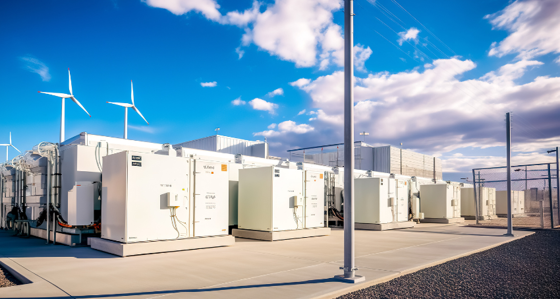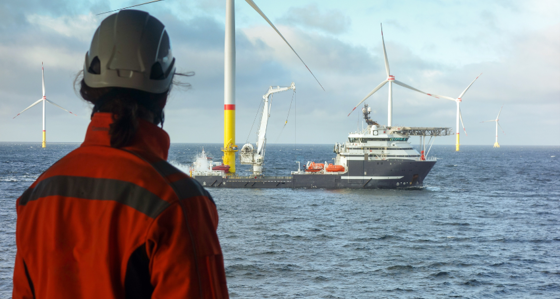
From commodity supply to intelligent service: How utilities can transform the customer experience with AI
8 min read 8 May 2025
Generative AI (GenAI) has landed, shaking up existing models of engagement and consumer expectations. At Baringa, we are seeing AI leaders across industries achieve 30%-50% uplifts in channel containment, 25% decrease in repeat rates, and millions of pounds of cost savings. AI is drastically rewriting the rulebook for what customers consider to be a good experience.
Utility providers face a clear choice. Embrace this wave of innovation or risk being left behind. Customer service must be fundamentally reimagined, with AI serving as the essential catalyst.
However, true transformation extends far beyond implementing chatbots or automating isolated contact centre functions. Success demands becoming an AI-driven, AI-literate organisation. This means continuously evolving organisational knowledge and culture while placing renewed emphasis on innovation and customer-centricity.
In this article, we'll examine the unique opportunities AI presents for transforming the utility customer experience. Read on to discover the most promising use cases for AI and GenAI implementations, along with four essential principles for maximising their potential.
Tapping a data goldmine
Energy retail in the UK is in the midst of a major shift. Utilities are rapidly evolving beyond simple commodity provision into sophisticated home optimisation, flexibility services, and management of decentralised energy resources with the end consumer. With these changes come unique opportunities for AI implementation.
Smart meter rollouts are gaining pace and unlocking a treasure trove of new data, which savvy utilities can convert into competitive advantage. On top of this, Ofgem’s Market-wide Half Hourly Settlement (MHHS) reform mandates the collection and settlement of smart meter data every half hour. These changes will deliver a continuous stream of granular, real-time consumption insights to consumers, suppliers, and grid operators alike.
For utilities, this level of data detail will be essential for developing sophisticated AI-driven models that deliver dual benefits. They can help customers access dynamic pricing models that reduce their bills while enabling energy providers to implement strategic load shifting that enhances grid stability.
While this evolution is currently centred on a few markets worldwide, including GB, it signals the inevitable direction for global energy systems. As more markets migrate toward granular data collection to support flexibility requirements, early AI adopters will establish strong competitive positions.
Turning the dial on contact centre experiences
AI is fundamentally reshaping customer interactions across industries, with utilities positioned to capture significant benefits. In utility customer service, we see AI being applied through three distinct paths.
- An agent productivity multiplier, providing real-time guidance, simplifying complex processes, and equipping contact centre representatives with instant access to comprehensive customer histories and technical information.
- An intelligent routing system, directing inquiries to the right specialist based on subtle contextual clues, significantly reducing transfer rates and resolution times.
- An end-to-end service solution. As technology matures, AI will be able to manage more complex, emotionally nuanced interactions like bereavement support, technical troubleshooting, and even sales conversations.
Beyond direct customer interactions, AI excels at service optimisation. Utilities can leverage AI tools to provide next-best-action recommendations to both customers and agents, enhancing service quality while simultaneously increasing cross- and up-sell opportunities.
E.ON's pioneering AI-powered chatbot exemplifies this approach. It provides electric vehicle (EV) drivers with personalised, real-time billing support, including clear explanations of usage changes. It proactively addresses the ‘bill shock’ and confusion that traditionally drive high contact volumes in utilities.
As capabilities continue to mature, AI will increasingly provide bespoke, human-like expertise to customers. Opportunity abounds for analysing energy usage patterns, individual needs, and even physical home environments to recommend energy-saving products and smart home solutions.
Learning from the leaders: Four keys to AI success
While AI adoption has surged across industries, including energy, we notice a clear pattern. The majority of organisations are only scratching the surface with isolated pilots and limited implementations of AI.
Still, a small group of pioneers has broken through, deploying AI solutions at scale and capturing tangible business value. What distinguishes these leaders? Our analysis reveals four fundamental principles that set successful AI implementers apart.
- Embrace holistic transformation. Leaders reject the notion of AI as merely another tool in their technology stack. Instead, they cultivate an expansive vision where AI permeates every aspect of operations. This means going beyond customer-facing applications to embed AI capabilities deeply into employee workflows and organisational DNA. Success comes from making AI an integral part of how business is conducted, building literacy at all levels, and fostering a culture where AI-powered decision-making becomes second nature.
- Build strong data foundations. Exceptional customer experiences depend on data that is accurate, clean, and relevant. Leaders invest in their data foundations before rushing to deploy enterprise-wide AI solutions. However, there are opportunities to realise benefits alongside a data programme, with careful planning and prioitisation of use cases, e.g. in our experience 15-20% of contact call volume can be contained easily using AI solutions.
- Develop clear channel strategies. Leaders make it unmistakably clear which communication pathways will deliver optimal experiences for specific needs. This clarity drives effective virtualisation of customer service, steering interactions toward channels where AI can provide maximum value while preserving human touchpoints where they matter most.
- Prioritise pace over perfection. Leaders prioritise rapid experimentation and iteration as they develop initial solutions. It is possible to launch a first deployment which is customer or agent facing within 12 weeks, with the right technical solutions underpinning it. Once live, mature organisations iterate and add use cases, developing tight feedback loops and delivering increased customer and business value.
Powering tomorrow’s experiences
The utility landscape is being redrawn before our eyes. As smart meters unleash unprecedented data opportunities, customer expectations soar to new heights, and AI capabilities mature, one thing becomes clear. Tomorrow's utility leaders will be defined by their ability to harness AI while maintaining an unwavering customer focus.
Whether you're just beginning your AI journey or looking to scale existing capabilities, Baringa can help you navigate this complex landscape. We partner with utility companies to build robust data foundations, develop clear channel strategies, embed AI literacy throughout organisations, and implement pragmatic, iterative approaches that deliver immediate value while building toward long-term excellence.
Ready to transform your utility customer experience? Get in touch with Ben Tomlinson-Men to learn how Baringa can help you unlock AI’s full potential while delivering exceptional customer value.
Our Experts

Related Insights

From Pilots to Portfolios: Scaling the Rollout of Utility Microgrids
Across the U.S., utilities are under pressure to deliver reliable, affordable energy in the face of rising risks and shifting policies. Download our research to see how scaling microgrids can help meet that challenge.
Read more
Unlocking the North Sea’s future potential with digital and AI
The North Sea is ready for its next chapter - powered by AI and digital innovation. Discover how this energy giant can be transformed into a low-carbon leader while boosting efficiency, investment, and resilience.
Read more
Safeguarding critical energy infrastructure against converging cyber and physical threats
UK energy utilities strengthen their resilience against emerging cyber-physical threats by developing a holistic security methodology that bridges digital and physical domains.
Read more
Vom Commodity-Anbieter zum intelligenten Dienstleister: Wie Energieversorger mit KI den Kundenservice transformieren
Die Rolle von Künstlicher Intelligenz im Wandel der Energiebranche
Read moreIs digital and AI delivering what your business needs?
Digital and AI can solve your toughest challenges and elevate your business performance. But success isn’t always straightforward. Where can you unlock opportunity? And what does it take to set the foundation for lasting success?